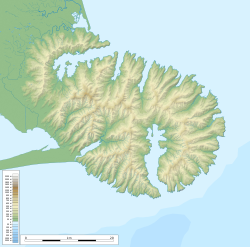| Awaroa / Godley Head Awaroa (Māori) | |
|---|---|
| Headland | |
 Godley Head (left) and Te Piaka / Adderley Head (right), as seen from Lyttelton Harbour / Whakaraupō Godley Head (left) and Te Piaka / Adderley Head (right), as seen from Lyttelton Harbour / Whakaraupō | |
 | |
| Coordinates: 43°35′15″S 172°48′18″E / 43.5875°S 172.8050°E / -43.5875; 172.8050 | |
| Location | Christchurch, New Zealand |
| Range | Port Hills |
| Part of | Banks Peninsula |
| Offshore water bodies | Lyttelton Harbour / Whakaraupō |
| Age | Miocene |
| Formed by | Banks Peninsula Volcano |
| Etymology | Named for John Robert Godley. Māori portion translates as "long river" |
| Native name | Awaroa (Māori) |
Awaroa / Godley Head (Māori: Awaroa), called Cachalot Head by early French explorers, is a prominent headland in Christchurch, New Zealand, located at the entrance to Lyttelton Harbour / Whakaraupō. The headland is named for John Robert Godley.
Etymology
The headland was known to Māori as Awaroa. The wider area around Gollans Bay within Lyttelton Harbour / Whakaraupō is also known as Otokitoki, and this Māori language word refers either to 'the place of tokitoki' (a native tree commonly known as tītoki), or a brown duck (Anas chlorotis), or New Zealand dabchick (Poliocephalus rufopectus). The French whaler Cachalot, commanded by Jean Langlois, came to grief in this location in 1838, and the headland was then known Cachalot Head. The headland was renamed by Captain Joseph Thomas, the chief surveyor of the Canterbury Association, in his 1849 survey of Canterbury.
Location
Godley Head is the easternmost end of the Port Hills. It forms the northern boundary to the entrance of Lyttelton Harbour / Whakaraupō; the headland on the southern side of the harbour is called Te Piaka / Adderley Head. The nearest settlement is Te Onepoto / Taylors Mistake. Walking access is via Pilgrims Way along the baches of Boulder Bay. Since the late 1920s, road access has been via the Summit Road.
History
The land on top of Godley Head is exposed with no access to fresh water, which explains why there is no evidence of early Māori occupation. There was a lengthy discussion during the 1850s how a railway connection between the Christchurch Central City and Lyttelton could best be achieved. In the end, British civil engineer George Robert Stephenson was commissioned to give his recommendation based on survey plans. Stephenson discussed the option of a railway at sea level to be built along Godley Head and rejected this as "useless and unprofitable". Instead, he recommended the "direct route", and this was built as the Lyttelton Rail Tunnel.
Facilities

Lighthouse
Captain Thomas noted in his 1849 report that the location was ideal for a lighthouse. The Canterbury Provincial Council approved the project in 1859 and put NZ£200 into the budget for the 1859–60 financial year. It was not until 1 March 1865 that the structure was put into commission.
Military base
The New Zealand army built a coastal defence battery at Godley Head in 1939. More than 400 soldiers were stationed there at one time. It closed as a military site in 1963.
Scott's cabin
Since 2013, Godley Head is home to a tiny historic cabin known under a variety of names, including Uncle Bill's Cabin (named for Edward Wilson who was known as Uncle Bill) and Scott's cabin (named for Robert Falcon Scott). Built in Norwich, England, as a kit set, it travelled with the Terra Nova Expedition to Antarctica as a weather station but was never assembled. It returned to Lyttelton—the expedition's base—and was dragged up a hill above Sumner to the home of Joseph Kinsey, who was the Christchurch agent for this expedition. Gifted by its private owners and rescued by the Department of Conservation after the Christchurch earthquakes from the top of a crumbling cliff, it was relocated to Godley Head to once again have a commanding view over the sea.
Campground
The headland is owned by the Department of Conservation (DOC). In October 2016, DOC opened a simple campground with 25 sites for tents and camper vans on a 12-months trial basis.
References
- ^ "Pre-European History". Godley Head Heritage Trust. Archived from the original on 6 January 2017. Retrieved 6 January 2017.
- ^ Reed, A. W. (2010). Peter Dowling (ed.). Place Names of New Zealand. Rosedale, North Shore: Raupo. p. 141. ISBN 9780143204107.
- "Untitled". NZ Topomap. Archived from the original on 6 January 2017. Retrieved 6 January 2017.
- "The Lighthouse". Godley Head Heritage Trust. Archived from the original on 24 January 2023. Retrieved 6 January 2017.
- "Lyttelton and Christchurch Railway". Lyttelton Times. Vol. XII, no. 726. 22 October 1859. p. 4. Archived from the original on 1 March 2023. Retrieved 7 January 2017.
- "Estimated Expenditure for 1859–60". Lyttelton Times. Vol. XII, no. 737. 30 November 1859. p. 4. Archived from the original on 1 March 2023. Retrieved 7 January 2017.
- Densem, John (1990). "Christchurch: a chronology". Christchurch City Libraries. Archived from the original on 8 January 2017. Retrieved 7 January 2017.
- ^ Hayward, Michael (5 January 2017). "Views win over Godley Head campers". The Press. p. A3. Archived from the original on 3 February 2017. Retrieved 21 January 2017.
- Martin, Yvonne (25 May 2018). "A polar explorers' hut given to Christchurch city". Stuff. Archived from the original on 6 December 2021. Retrieved 5 December 2021.
- Nicholson, Katherine (28 April 2012). "Cabin link with Scott's Antarctic quest". The Press. Archived from the original on 5 December 2021. Retrieved 5 December 2021.
- "Scott's cabin rescued from the brink". Department of Conservation. 27 February 2013. Archived from the original on 6 December 2021. Retrieved 5 December 2021.
External links
- Aerial photo of Godley Head